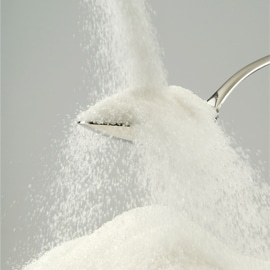Sugar and your Diet
Sugar is a form of simple carbohydrate. While this makes it a nutrient, it is not to be mistaken for nutritious. Calories from sugar are often called empty calories because they are devoid of all nutritional value, but will still contribute to weight gain. In the United States, the average adult eats about three times more sugar every day than is recommended for good health.
 Sugar is a form of simple carbohydrate. While this makes it a nutrient, it is not to be mistaken for nutritious. Calories from sugar are often called empty calories because they are devoid of all nutritional value, but will still contribute to weight gain. In the United States, the average adult eats about three times more sugar every day than is recommended for good health.
Sugar is a form of simple carbohydrate. While this makes it a nutrient, it is not to be mistaken for nutritious. Calories from sugar are often called empty calories because they are devoid of all nutritional value, but will still contribute to weight gain. In the United States, the average adult eats about three times more sugar every day than is recommended for good health.
Sugar and your Health
In recent years, there has been a lot of talk about the health consequences of eating sugar. Some nutrition experts have even gone so far as to call sugar toxic, and have petitioned for it to be banned or controlled like a drug. While this may be an extreme position, the numerous negative health consequences of sugar make it a legitimate health risk.
Eating too much sugar can negatively influence your health, increasing your risk for health problems like:
- Obesity
- Type-2 diabetes
- Heart disease
- Fatty liver disease
- Mental health disorders like depression
- Tooth decay
- High cholesterol
Sugar is present almost everywhere. Forms of sugar are found in natural foods like fruits and vegetables, in processed foods and especially in beverages like fruit juice and soda. Approximately one-third of excess sugar consumption is attributed to soft drinks.
Other common sources of sugar in our diets include:
- Baked goods
- Candy
- Processed foods
- Dairy products, especially ice cream and whole milk
Cutting Sugar from your Diet
As you cut calories, you want to make sure you are maximizing your nutrient intake. Since sugar is high in caloric content and offers no significant benefits in the way of additional nutrients, vitamins or minerals, you may be encouraged to reduce the amount of sugar you take in during your medical weight loss program.
Cutting sugar out of your diet altogether might be challenging, but there are plenty of ways that you can gradually reduce your consumption of it.
Limit your sugar intake by:
- Chewing sugar free gum to satisfy a sweet tooth
- Drinking your coffee or tea without added cream or sugar
- Drinking water instead of soda
- Reading nutrition labels and avoiding foods that are high in sugar content
While eating just a small amount of sugar may not negatively affect your health, it is easy to over-do it. Do your best to avoid sugar by becoming more cognizant of your dietary choices. Reducing your intake of sugar can help your health and your weight loss efforts.



This is so important. People need support because the marketing is unrelenting.
I met Dr. Robert Lustig at the ASBP conference this past weekend. In his book “Why we get fat” he blames sugar. In grocery store foods, 80% have added sugar. There are 56 names for sugar. He states that the added sugars cause insulin resistance, which is the underlying metabolic pathway leading to obesity. He says obesity is our bodies metabolic adaptation to allow them to deal with the toxic levels of sugar. Very interesting gentleman indeed!